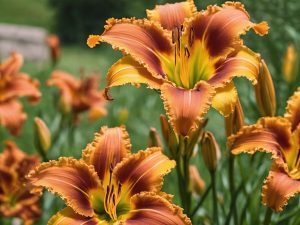Can Rabbits Eat Daylily Flowers? Nutritional Benefits, Diet & Serving Tips (In Moderation)
Daylilies are an absolute sight to behold, aren’t they? With their vibrant colors and delicate petals, they paint gardens with strokes of brilliance. But while we’re busy admiring them, our little bunny friends might be eyeing them for an entirely different reason: a potential snack. If you’ve ever caught your rabbit trying to take a nibble, you might’ve wondered, “Is this safe?” Let’s dive into the world of daylilies and discover what they mean for our furry pals.

What are Daylilies?
Daylilies, scientifically known as Hemerocallis, are perennial plants, which means they grace our gardens year after year without the need for replanting. They’re called ‘daylilies’ because each of their lovely flowers typically lasts just a day. But don’t be saddened by that fleeting beauty; these plants more than make up for it by producing a series of blooms, ensuring a steady show of splendor.
While they’re known commonly as daylilies, they’re sometimes referred to by other names based on their color or variety, such as the ‘Stella de Oro’ or the ‘Ruby Stella’.
The Rabbit-Daylily Dilemma: Can Bunnies Eat Them?
In short, yes, rabbits can eat daylilies. But, like many things in life, there’s a tad more to it. While the daylily’s petals are generally safe and even nutritious for bunnies, other parts of the plant, like its tubers, might not be ideal for consumption.
Quantity Matters
Remember the age-old saying, “Too much of a good thing…”? Well, it applies here too. While a petal or two might be a delightful treat for your bunny, turning daylilies into a regular buffet might not be the best idea. It’s always essential to introduce any new
Why Daylilies Might Just Be a Good Idea (In Moderation, of Course)
- Vitamin Boost: Daylilies are known to have a good amount of vitamin C. This isn’t just good for us humans but for our furry companions too.
- Digestive Health: They also bring in a decent amount of fiber to the table (or should we say, garden?). Fiber is paramount for a rabbit’s digestive system.
In Conclusion
Sharing our lives with pets like rabbits means constantly learning about what’s best for them. While daylilies can be a fun and nutritious addition to their diet, like with all things, moderation is key. It’s always a blend of research, observation, and a sprinkle of common sense. And hey, while you’re at it, why not spend some time lying in the garden, watching your bunny enjoy their treats? It’s the simple joys that make life so special.
Here’s to blooming gardens, happy bunnies, and shared moments of joy!
Nutritional Benefits of Daylily Flowers for Pet Rabbits
References
- Can rabbits eat daylilies?
- Can rabbits eat flowers?
- Can rabbits eat flowers?
- Healthy foods for rabbits
Words of Caution
- Chemicals & Pesticides: If your daylilies are from a garden store or nursery, they might have been treated with chemicals or pesticides. Ensure they’re washed thoroughly, or even better, only offer organically grown daylilies to your bunny.
- Not All Lilies Are Created Equal: While daylilies are safe, other types of lilies can be toxic to animals. So, ensure you’re indeed dealing with daylilies before letting your rabbit have a go.
Looking for Alternatives or Additions? Fruits and More!
Perhaps daylilies aren’t a hit with your bunny, or maybe you’re looking to offer some variety. Here are a few alternatives that might tickle their taste buds:







Leave a Reply